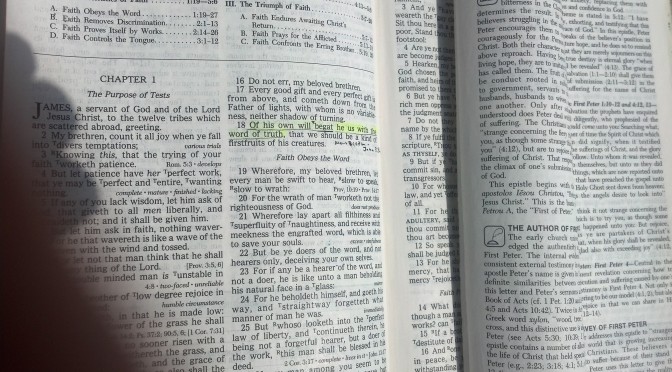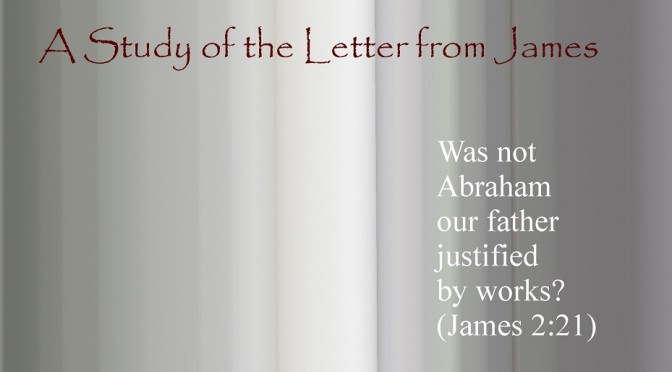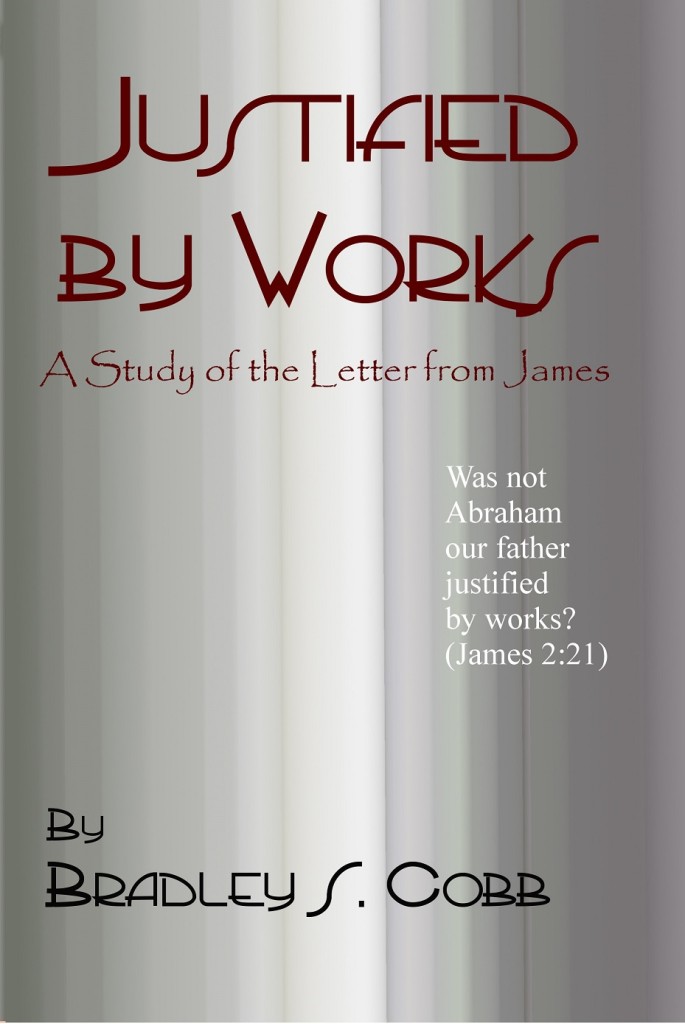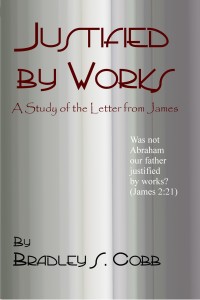As a gift to our readers, we’re presenting here the complete introduction from Justified by Works: A Study of the Letter from James, by Bradley Cobb (available in print or eBook here). Our regular Bible Q&A segment will return next week. Enjoy!
Introduction
The book of James is unique among the New Testament letters. At first glance, like the book of Proverbs, it seems to be a disconnected series of practical godly living. Some, because of the content of the letter, rejected it as authentic. Others accepted the book but have denied the truths contained therein. Among those who believe in the inspiration of the Bible, there is more debate about the author of this book than any other (except perhaps Hebrews). There’s even disagreement about why and when the book was written. But even with all these disagreements, the letter from James is a goldmine of knowledge and practical application. It’s no wonder that James is many Christians’ favorite book of the Bible.
Who Wrote It?
All Scripture is inspired by God (I Timothy 3:16). As such, the author is God, who by means of the Holy Spirit inspired men to write down His holy word (II Peter 1:21). But now, the question before us is: what man did God inspire to write the book called ‘James’?
The name James is the same as the Old Testament name Jacob. In fact, in Greek, James is spelled Iacob (there is no letter J in Greek). The writer of this book was named after the great patriarch of Israel: Jacob.
There are four men in the New Testament who were named James. Three of them were holy men of God who spoke by inspiration. Each of these three have—to one degree or another—been suggested as the author of this book. But in order to narrow it down, let’s consider each one individually.
James, the brother/father of Judas
The only thing we know for sure about this man is that he was related to Judas, one of the twelve apostles (Acts 1:12-14). The Greek text literally says “Judas of James.” Almost every translation adds words explaining this phrase. The King James Version reads “Judas the brother of James.” The New King James Version reads “Judas the son of James.”
The King James rendering tries to make a connection between this Judas/James relationship and the words of Jude in Jude 1. The New King James rendering is more true to the original language, and appears to distinguish Judas the son of James from Judas Iscariot (something which the original writers thought was necessary—John 14:22).
No one has seriously considered this man as the author of the book of James for the following reasons:
- No one knows if the man was living or dead when Jesus chose His disciples.
- No one knows if this man (if he was still alive) ever became a Christian.
In short, there is nothing in the Scriptures to suggest that this man could have been the inspired writer of James.
James, the son of Zebedee.
This man was among the first of Jesus’ disciples (Mark 1:19-20), and one of the twelve apostles (Matthew 10:2-4). He was a fisherman by trade, the brother of the apostle John (who wrote five New Testament books), and was one of Jesus’ closest friends. Only James, John, and Peter were permitted to go with Jesus to the mountain to witness the Transfiguration (Matthew 17:1-2).
This James is usually rejected as the writer because he was murdered by Herod around AD 44 (Acts 12:1-2). One has to wonder, however, why James couldn’t have written this book before his death. This question is even more applicable when you realize that many writers think this book was written very early (usually suggesting around AD 45).
Having said all that, this James was not the author of the letter called James. The contents of the letter demand a date after this James—the son of Zebedee—was killed. This will be covered more when we get to the section titled When Did He Write It?
James, the son of Alphaeus.
This man was an apostle of Jesus Christ (Matthew 10:2-4). He was also the brother of another apostle, Matthew (or Levi), who wrote the first book of the New Testament (see Mark 2:14). It is generally agreed that he is the James mentioned in Mark 15:40. There, he is called James the Less. Literally, that verse calls him “James the little one” or “the short James.” It is the same word (mikron, mirco) that is used to describe Zaccheaus—the “wee little man.” James, the son of Alphaeus, was short.
Some people—mostly Catholics—have gone to great lengths to supposedly prove that this James is the same as the man known as James, the Lord’s brother (they say it means “cousin”). Guy N. Woods has shown beyond a doubt that this cannot be the case.[1] We can summarize his main points as follows:
(1) The apostles had been chosen out of His disciples—those who believed in Him—but Jesus’ brothers did not believe in Him (John 7:5). Therefore, none of Jesus’ brothers were apostles.
(2) Jesus’ brothers are mentioned as a separate group from the apostles (I Corinthians 9:5, Acts 1:13-14). Therefore, none of the apostles were brothers of Jesus.
This James, being an apostle, would be a prime candidate to write inspired Scripture. The main argument against his being the writer is that he actually was an apostle. The man who wrote this book identifies himself as “a servant of God and of the Lord Jesus Christ.” The argument goes like this: since he didn’t identify himself as “James, an apostle of Jesus Christ,” then that proves he wasn’t an apostle. However, Paul didn’t identify himself as an apostle in four of his letters (Philippians, 1 and 2 Thessalonians, as well as Philemon). John never identified himself as an apostle in his letters or in Revelation. This argument carries little—if any—weight.
The second argument used against this man as the author is that nothing is known about him outside of the fact that he was an apostle of Jesus Christ. Barclay states it this way: “of James, the son of Alphaeus, nothing else is known; and he also can have had no connection with this letter.”[2] Shelly says, “So obscure a person could hardly have written this kind of letter, for the epistle of James presupposes the fact that its readers would know its author and heed its counsel accordingly.”[3] One man said that if this James were the one who wrote it, he would have given extra information to show that he was he James under consideration. This argument is an argument from supposition. It assumes that the apostle James was not well-known enough to have just identified himself as “James.” The early church would have been familiar enough with the apostles that if the apostle James had written them a letter, he wouldn’t have had to specify that he was James the apostle.
N.T. Caton, among others, takes the stance that James, the son of Alphaeus, is the man who wrote this letter. He states:
To these twelve men [the apostles] the Master had said: “He that receiveth you receiveth me, and he that receiveth me receiveth him that sent me.” I conclude, therefore, that the twelve were essentially ministers plenipotentiary [invested with the full authority of Christ]. They spake for the King, and when they spake it was the same as if the King had spoken. None others could be so recognized.[4] [Bracketed explanations and bold font added.]
I have no arguments against James, the son of Alphaeus, being the author of this letter. However, I believe that another James is more likely.
James, the brother of Jesus Christ
This man, the son of Joseph and Mary—and thus the half-brother of Jesus—didn’t believe in Jesus during His earthly ministry (John 7:5). But something happened to radically alter everything he thought he knew about his older brother. After His death and resurrection, Jesus appeared in person to James (I Corinthians 15:4-7). James was a man convinced and convicted. He would have quickly gone to tell his other brothers (Jude, Joseph, and Simon) that they had been wrong. We know this because less than 50 days after the death of Christ, all of Jesus’ brothers were gathered with the apostles and other disciples of Jesus (Acts 1:12-14). After Pentecost, James was an integral part of the church in Jerusalem. He was called a “pillar” of the church there (Galatians 2:9), and was numbered with their elders by AD 49-50 (Acts 15:6, 13; 21:18).[5]
His work for the Lord was focused on the Jews (Galatians 2:9). His concern for the Jewish Christians can be seen in his conversation with Paul in Acts 21:17-26. He is mentioned by Josephus (a non-Christian Jewish historian in the first century) as one who was murdered by order of the Jewish high priest in AD 62. An early Christian historian, Hegesippus, —though he embellished parts of it—records that James was viewed in high regard by all Jews because he was frequently to be found at the temple on his knees praying for the Jews. Because of his unwillingness to show respect of persons, it is said that he was known as “James the Just.” This same historian records that James was cast from the pinnacle of the temple, but survived long enough to pray for his attackers before being stoned and then finally being beaten to death with a club. Hegesippus dates his death immediately before Vespasian’s army came against Judea (AD 66-67, though some believe this is speaking of the attack after Vespasian became emperor, which would place it in early AD 70). How much of this is truth and how much is embellishment is difficult to tell. Josephus, having no sympathy for the Christians, would seem to be the more reliable account. Either way, it is agreed by all sources that James, the Lord’s brother, was murdered because he was an outspoken Christian.
This James is the most likely candidate for the author of the book which bears his name. The following reasons are given in support of his authorship:
- His ministry was to the Jews (Galatians 2:9). The book of James was written to a Jewish audience (James 1:1).
- Because of his status and influence within the Jerusalem church as an elder (a status he shared with Peter and John), and being Christ’s brother, there would have been no question as to his authority in writing this letter.
- What we read of James from Acts 15 and 21 shows that he was focused on practical application of God’s word. The book of James is almost exclusively devoted to practical applications of God’s word.
- There are some specific Greek words and phrases that are only appear in two places: (1) Acts 15 in connection with the brother of Jesus, and (2) in the book of James.
o “Hearken” – Acts 15:13 (spoken by James) and James 2:5.
o “To visit” – Acts 15:14 (spoken by James) and James 1:27.
o “Your souls” – Acts 15:24 (perhaps written by James) and James 1:21.
Outside of the Bible, the first mention of the authorship of James comes from the third century when Origen attributed the book to the brother of Jesus.
Some have argued against this James as the author, saying that the Greek in this letter is too far advanced for a Jew from Galilee. J.W. Roberts, a Greek scholar who taught at Abilene Christian College many years ago, spends a lot of time proving this argument false.[6] Basically stated, Greek was a universal language. Most first-century Jews would have been bilingual, and would have been quite fluent in it. Besides this, we are told nothing about the education of James. Can anyone say with any degree of certainty that James never worked on becoming proficient in speaking and writing Greek? It’s basically the same as saying that no one from Mexico could ever write something well in English.
It is James, the brother of Jesus (and of Jude—see Jude 1) that most likely wrote this book.
Who Did He Write to?
Like Peter and John, James directed his ministry toward the Jews (Galatians 2:9). It should come as no surprise, then, that his letter was addressed to Jews. However, this wasn’t written to just any Jews. James had a specific audience in mind when he wrote.
James wrote to “the twelve tribes scattered abroad” (James 1:1). Literally, this says “the twelve tribes in the dispersion.” The Greek word translated scattered abroad is diaspora. This is a technical word that meant “Israelites dispersed among foreign nations” (Thayer). The word only appears three times in the Bible. James 1:1, I Peter 1:1, and John 7:35. Each time it has reference to the Jews who lived in the Gentile nations. James was writing to Jews who did not live in the Promised Land.
Some have said that James was using the phrase “the twelve tribes scattered abroad” spiritually to refer to the Christians scattered throughout the Roman Empire. This is trying to force a figurative meaning on the words when a literal one fits the evidence. It should also be noted that James wrote to people who met in the synagogue (James 2:2—the word translated assembly is the Greek word sunagoge). The synagogue was a Jewish meeting place.
But the audience is even more specific than that. James was writing to Christian Jews who were scattered abroad. James wasn’t writing to non-Christians. This is obvious when you read James 2:1: My brethren, do not hold the faith of our Lord Jesus Christ, the Lord of glory, with partiality (NKJV). He couldn’t have called Jesus our Lord if his readers weren’t already Christians.
It is possible (especially if an earlier date is assumed—see below) that James is writing to those who had come to Jerusalem for Pentecost (Acts 2) and who had stayed in Jerusalem with the church. Many of these people were forced to flee the city because of the persecution brought on by Saul of Tarsus (Acts 8:1-4).
James wrote to Jewish Christians who were living outside of Palestine, throughout the Roman Empire. Interestingly enough, this is also the audience that both Peter (I Peter 1:1) and John (Revelation 1:4) wrote to as well.
When Did He Write It?
Most writers suggest a period of time between AD 45 (after the death of James, son of Zebedee) and AD 62 (when Josephus records that he was killed). There are arguments for an early date (45-50), as well as arguments for a later date (61-62). We will briefly consider both.
The Early Date (AD 45-50)
James, the brother of Jesus, isn’t seen as a leader in the church until after the death of James, son of Zebedee, in AD 44. Because of this, most people propose a date of no earlier than AD 44. Here are the arguments used in favor of an early date (note: compare these with the arguments for the late date).
- Because there is no mention of Gentile Christians or the problems that were addressed in Acts 15 (AD 49-50), this letter was written before these things became an issue.
- The persecution that the Jewish Christians were suffering (James 1:2, c.f. Acts 8:1-4)[7] was not as severe after AD 50, so it must have been written before that date.
If this letter was written in the 40’s, then it may well be the earliest of all the inspired letters.
The Late Date (AD 58-62)
Obviously, James could not have written the book after his death, so the latest possible date is AD 62. The evidence in favor of the late date is as follows:
- There is no mention of the controversy surrounding the Gentile Christians, such as was addressed by James in Acts 15. Thus, this must have been written at a time when the controversy had settled down.
- The persecution that the Jewish Christians were suffering was intense throughout the Roman Empire, specifically from other Jews (see Acts 17:5-7, 21:27-28, Revelation 2:9).
If you’ll notice, the main arguments for an early date are the same arguments used for the late date. J.W. Roberts stated:
There is really nothing decisive to settle the question. There is an 18-year period from 44-62 A.D. when the letter was most likely written. But the choice between the middle of the 40’s and the decade of the 50’s is difficult. This writer would incline to the latter date, but it is merely a feeling.[8]
Before we move from the discussion of the date, there is one more piece of evidence that must be considered. This evidence, in my opinion, is conclusive.
You also be patient. Establish your hearts: because the coming of the Lord is at hand (James 5:8)
The phrase “at hand” shows the nearness of something. The only coming of the Lord that was near in the first century was the coming of Christ in judgment upon Jerusalem in AD 70 (see Matthew 24:1-34, especially verses 27, 30, and 34). This argues heavily for a later date (AD 60-62) and against an early date.
If Josephus is correct in dating James death in AD 62, then this book should be dated about 61-62. If Hegesippus’ dating of James’ death is correct, then this book could be written as late as AD 66-67.
Why Did He Write It?
This question is one that we should ask about every book of the Bible as we begin to study it. It is when we understand why it was written that we can begin to truly understand what it means and how it applies to us.
To Supplement Paul’s Epistles?
False teachers had been perverting Paul’s teachings, claiming that salvation is by “faith-only” and that “works have nothing to do with salvation.” Because of this (it is claimed), James wrote this letter to counteract these false teachers, and to show that “faith without works is dead.” While this is indeed possible, it is based mostly on guesswork.
It is interesting that these false teachings are still prominent in the religious world today.
To Encourage Practical Christian Living.
Many people are obsessed with learning, understanding, arguing, and debating things in the Bible. There are many Christians whose study of God’s word is barely more than an intellectual pursuit. People break off into groups based on their unique collection of theological beliefs. If you don’t believe it, go to a congregation and ask them which congregations that they have nothing to do with. Then ask them why. Many times, the answer is that the other congregations believe something differently.
In the face of such differences, James basically says that the true test of Christianity is not your theological beliefs, but on your actions.
Pure and undefiled religion before God the Father is this: to visit the orphans and widows in their afflictions, and to keep himself unspotted from the world (James 1:27).
After all, what is it that we will be judged on? The Scriptures never say that Christians will be judged based on their beliefs on eschatology or expediency. Instead, the Scriptures are clear that in the final judgment, we will be judged based on our works.
For we must all appear before the judgment seat of Christ; that everyone may receive the things done in his body, according to that which he has done, whether it be good or bad (II Corinthians 5:10).
Then shall the King say to them on His right hand, “Come you blessed ones of my Father, inherit the kingdom prepared for you from the foundation of the world. Because I was hungry, and you gave me food. I was thirsty, and you gave me drink. I was a stranger and you took me in. I was naked and you clothed me. I was sick and you visited me. I was in prison and you came to me.”… And the King will answer and say to them, “Verily I say unto you, Inasmuch as you have done it to the least of these, my brethren, you have done it to me” (Matthew 25:34-40).
And I saw the dead ones, great and small, stand before God; and the books were opened…and the dead were judged out of those things which were written in the books, according to their works (Revelation 20:12).
After reading these passages, you could imagine the following scene taking place at Judgment:
“But God, how could you let HIM in? He believed __________!” God ‘s reply, “He gave his money to the poor, worked tirelessly in evangelism, brought many to Christ, and humbly repented any time he discovered he had sinned.”
In fairness, there are obviously certain things we must believe in order to be among the saved (believe in God, believe in Jesus as the Christ, the Son of God, and believe that the Bible is His inspired word). But these are necessary in order to become a child of God.
James writes to get people to move from being an intellectual Christian to being Christian who shows his faith through his works.
Some Other Thoughts
When you get in the habit of living out your Christianity, it becomes more and more a part of you. It is quite possible that James was trying to get Christians in this habit because he knew that it would help make them more faithful. This is important when you understand that within three years, the Christians’ world was turned completely upside down as Rome and the Jews launched a joint attack against them—thousands upon thousands of Christians were ruthlessly murdered in the years that followed.
The conclusion? The time to get in the habit of living out your faith for Christ is now.
The book of James encouraged them, but it also encourages us to live a life of faith shown by our works. Don’t be a mental disciple, but be an active one!
James’ Place in the Bible
It has been argued by some that James wasn’t really inspired, and they give different reasons for this assertion. Some say that James contradicts Paul, therefore James isn’t inspired. The truth of the matter is that James contradicts what people have claimed Paul taught. James and Paul are in perfect harmony with each other when you throw out the false idea of “faith-only” salvation.
Others make the claim that James wasn’t widespread in the early churches, so it couldn’t have been accepted as inspired. It’s easy to explain why copies of James may not have been widespread. The massive persecution which began in AD 64 wiped out entire Christian communities and all of their writings throughout the Empire. Since James was written in 61-62, there would not have been as much time for it to be copied and spread around. This is the same reason why there were not many copies of II Peter, Jude, Revelation, II John and III John found from that period.
There are several early writers who allude to James, and some outright quote his letter as authoritative Scripture. Some scholars have shown that some Christian writers as early as the first century (AD 80-99) based parts of their writings on the book of James.
Conclusion:
Regardless of when it was written and which James wrote it, this book is filled with practical, useful instruction that applies to every Christian’s life, every single day. The commands may not always be easy, but you can rest assured that they are right and that they are from God, given as a gift to the ones who are willing to accept them (II Peter 1:3, James 1:17).
[1] See Woods, Guy N., Gospel Advocate Commentary on James, pages 12-ff.
[2] Barclay, William, The Letter of James, Revised Edition, page 8.
[3] Shelly, Rubel, What Christian Living is All About (Studies in James), page 3.
[4] Caton, N.T., Commentary on the Minor Epistles, pages 5-6
[5] It should be noted here that the text of Acts 15 nowhere states that this James is the Lord’s brother. However, what we learn from Paul in Galatians 2 seems to indicate that the Lord’s brother was a man of great influence in the Jerusalem church. As such, the general consensus is that the James from Acts 15 is the Lord’s brother. But to be fair, it is possible that Acts 15 is a reference to James the apostle.
[6] Roberts, J.W., A Commentary on the General Epistle of James, pages 13-16
[7] Shelly, Rubel, ibid, page 6.
[8] Roberts, J.W., ibid, page 27.




